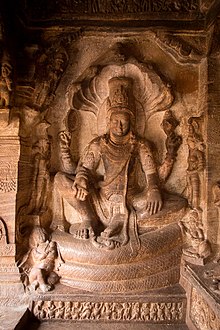| Narayana (Vishnu) | |
|---|---|

A depiction of Lord Narayana at Badami cave temples
|
|
| Affiliation | Deva, Trimurti |
| Abode | Vaikuntha |
| Mantra | ॐ नमो नारायणाय |
| Weapon | Chakra, Gada, Padma, Sankh |
| Mount | Garuda |
| Texts | Vedas |
| Consort | Lakshmi and Prithvi |
| Parents | Para-brahman and Adi Parashakti |
| Part of a series on |
| Vaishnavism |
|---|
 |
Narayana engages in the creation of 14 worlds within the universe as Brahma when he deliberately accepts rajas guna according to Brahmanism. Narayana himself sustains, maintains and preserves the universe as Vishnu. In Shaivism, Narayan also accepts sattva guna and annihilates the universe at the end of maha-kalpa as Shiva or Rudra when he accepts tamas guna.[2][3][4] According to the Bhagavata Purana, Lord Narayana is the supreme controller and is supreme among deities, the ultimate soul. He is also called as Surya Narayana, one who shines like the brilliant sun. [5][6] He is said to pervade whatever is seen or heard in this universe from inside and outside alike.[7] He is also mainly associated with the cosmic waters of creation.
According to Madhvacharya, Narayana is one of the five vyuhas of Kṛṣṇa, which are cosmic emanations of God in contrast to his incarnate avatars.[8]
Contents
Description
Lord Narayana/Hari
Lord Narayana is also often identified as Sharangapani, Vishnu, Hari, Purushottama or Purusha and Jagannath in the Hindu sacred texts such as the Bhagavad Gita, the Vedas and the Puranas[9]. Narayana is also venerated as Mukunda[10] (giver of Moksha, liberation from cycle of births and deaths in the material world). In the Mahabharata, Krishna is often referred to as Narayana and Arjuna as Nara.[11] The epic identifies them both in plural 'Krishnas', or as part incarnations of the earlier incarnations of Vishnu, recalling their mystical identity as Nara-Narayana.[12]
Narayana is also described in the Bhagavad Gita as having a universal form (Vishvarupa) which is beyond the ordinary limits of human perception or imagination.[13]
Narayana's eternal and supreme abode beyond the material universe is Vaikuntha which is a realm of bliss and happiness called Paramapadha, which means final or highest place for liberated souls, where they enjoy bliss and happiness for eternity in the company of supreme lord. Vaikuntha is situated beyond the material universe and hence, cannot be perceived or measured by material science or logic.[14] Sometimes, Ksheera Sagara where Narayana or Vishnu rests on Ananta Shesha is also perceived as Vaikuntha within the material universe.
Ancient Texts
Lord Narayana is hailed in each and every part of Vedas like, Shatarudriyam, Purusha Suktam, Narayana Suktam, Hiranyagarbha Suktam, Vishnu Suktam, Rudra Suktam.Lord Narayana is also hailed in the Upanishads like, Narayana Upanishad, Isopanishad, Chandogya Upanishad, Brihadaranyaka Upanishad, Mundaka Upanishad, Mandukya Upanishad, Katha Upanishad, Kenopanishad, Prasna Upanishad, Svetasvatara Upanishad, Maha Narayana Upanishad, Narasimha Tapani Upanishad.[15]
Etymology
There are multiple variations of Lord Narayana's name.The word 'Narayana' means "The one who rests on waters of creation". The Manusmriti states,
- The waters are called "narah", for the waters are, indeed, produced by Nara-Narayana (the first Being); as they were his first residence "ayana", he is called Narayana.[16]
- "The Supreme Being who is the foundation of all men".[17]
- Nara means "human" and Ayana as "direction/goal". Some view Narayana as meaning "son of man." Hence, Narayana refers to the "direction of a human" (towards moksha).
- Om Namo Narayanayeti mantra upasaka Vaikuntha bhuvanam gamishyati,[18]
In the Vedas, it is written,
- "Narayana parabrahman tatvam Narayana paraha"



No comments:
Post a Comment